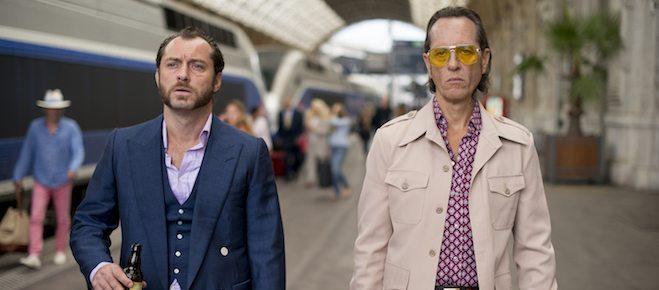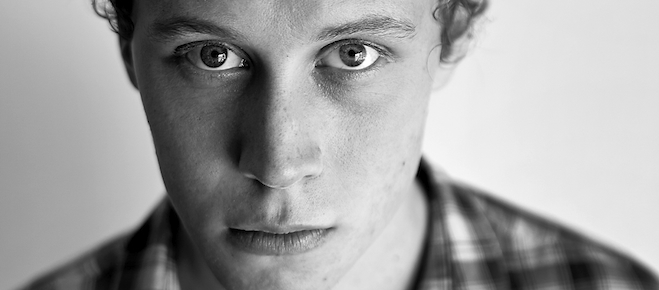TIFF 2013 Diary, Day 7
Highlights from the seventh day of the festival, including
Jude Law’s thug life and Saoirse Ronan’s apocalyptic
romance
Jude Law and Richard E. Grant in Don Hemingway (TIFF)
Share

For journalists, the Toronto International Film Festival is a heady 11-day stew of screenings, interviews and alcohol-soaked after-parties. Throughout the fest, I’ll be delivering daily updates on every aspect of this year’s monstrous event (free booze not included—sorry).
The movies: Wednesday proved to be bittersweet, as it marked my last “official” day attending the festival (the office beckons, and all—plus, I’m
fairly certain I’m this close to dying from exhaustion). I wasn’t the only one checking out early, as most of the international media cleared town Tuesday night, giving the press and industry lounges an eerie, almost end-of-days feel (on the plus side: enough free sandwiches and computer terminals for all!).
This vague, almost post-apocalyptic scene proved to be a perfect segue to my first screening of the day: How I Live Now. Directed by Kevin Macdonald (The Last King of Scotland), the romantic drama tries to fit itself into the Hunger Games mold, as it focuses on two young lovers caught up in a disastrous near-future, as all popular young-adult movies must now do.
Saoirse Ronan headlines the film as a mopey American teen named Daisy, who is forced to live with her step-cousins in their isolated, perpetually sun-dappled rural estate. After a bit of prodding and a lot of picture-perfect English countryside, Daisy drops her sullen ways and falls madly in love with her rugged relative Edmond (remember: step-cousins, so it’s technically OK). All is lovely and perfect until terrorists hit London with a nuclear blast, and the country falls into panic. (Is the bombing acting as a sort of warning to sexually active teens, perhaps? Keep it in your pants or we’ll annihilate Europe?) Soon after the attack, the army forcibly separates the family, leaving Daisy and a younger cousin to make their way across a tattered England and back into Edmond’s loving, far-too-rugged for a 16-year-old’s arms.
With the intimate family drama at its centre, Macdonald keeps the dystopic elements in the background, which could have proved a fatal move if his lead actors weren’t so strong. And although the Daisy-Edmond relationship happens too fast and too intensely to be believed (although that is the nature of young love/lust), the film makes a fine addition to the burgeoning young-adults-in-peril genre.
After How I Live Now‘s heavy tears and heavier bombs, I looked to Jason Bateman’sBad Words to lighten the day. The dark comedy, in which a fortysomething man (Bateman, wisely casting himself) competes against children in a national spelling bee, is clearly made using Terry Zwigoff’s
Bad Santa formula: crass adult + cute kid + intolerable behaviour = comedy. For most of its running time, this actually works, though Bateman balks at the very end, inserting sentimentality where acidity could have done wonders. Still, it’s an impressive debut from an actor who’s been saddled with the most uninspiring of big-screen projects. No one needs another Identity Thief, after all.
While Bad Words shows a man behaving horribly, it’s got little on the antics of Dom Hemingway‘s title character, a recently incarcerated British thug who, he readily admits, “has a bit of an anger problem.” As played by Jude Law—all widow’s peak and flabby belly, a study in lower-class, guttural character acting—Dom is typical of the Guy Ritchie vein of British gangsters, which is only half of what makes Richard Shepard’s film so problematic.
At one point, we’re supposed to laugh at Dom’s casually violent antics, then 10 minutes later, feel sympathy for the man as he pleads for his daughter’s acceptance. Tonally, the film is all over the place, as if it can’t decide between being a violent cartoon or a kitchen-sink drama. Although it has style to spare (the art direction makes Sexy Beast look like an early Kevin Smith film), there are only so many beautiful things to distract from the too-loose narrative. Even co-star Richard E. Grant looks bored, perhaps the cinematic gravest sin of them all.
The talent: Just an hour or so after How I Live Now finished screening, I jumped/speed-walked/dashed/ran to the InterContinental Hotel for a pair of interviews with the film’s deliriously photogenic stars, Saoirse Ronan and George MacKay. Although I fretted over pronouncing Ronan’s first name for the majority of the interview, she was pleasant enough that even if I got the chance to screw it up, she would have likely brushed it off.

While I can’t publish my full interviews with the pair until the film comes out this fall (studio embargoes are a funny thing), I can happily reveal that Ronan has never read the Meg Rosoff book on which it’s based, and MacKay has possibly the most adorable and soft-spoken British accent I’ve ever encountered. Oh, and if you ever happen to meet Ronan in a crowded room—good luck with that—bring up Breaking Bad. It will be the most fun you’ve ever had discussing meth and cancer.
The parties: The party is over, my friends. The party is over.